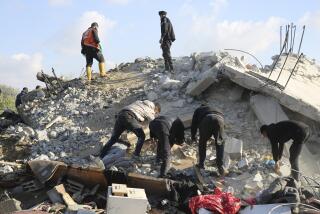While critics carp, airstrikes in Iraq prevent genocide
Commenting on the brutal mess in Iraq, a letter writer in the August issue of Rolling Stone asks, “Did the U.S. make Iraq worse? Maybe, but other places go to hell on their own.” Though that viewpoint may too easily excuse a multitude of national sins, it is still at least as insightful as current critiques of American foreign policy emanating from both the left and right.
Much of the world is, indeed, going to hell on its own. Because American military force has sometimes made things worse in the past, should the U.S. now refrain from using its power to stamp out a few hellish fires? Activists on the left lean toward an affirmative answer to that question. Convinced that the ill-conceived invasion and occupation of Iraq during the George W. Bush administration is the cause of all the miseries that have followed, they condemn President Obama for ordering airstrikes against the invading army of Sunni fanatics known as the Islamic State.
The antiwar group Code Pink is calling on people to march in the streets to block any new U.S. military action in Iraq. Their first attempt -- a protest at the White House -- was a bit of a flop; only seven people showed up. Undeterred, Code Pink co-founder Medea Benjamin told the Huffington Post she was sure the movement would grow if the bombings continued.
“This whole idea that the U.S. should play the global policeman is not only ineffective but counterproductive,” Benjamin said. “We are very far away from Iraq; we’re not one of the neighbors. It should be dealt with by neighbors and the U.N. And the U.S. has been seen for the last 12 years as being way too involved in the Middle East and making a mess of things.”
MoveOn.org has also raised an alarm about the U.S. jumping in to aid Iraqi Kurds and minority religious communities who have been attacked by the Sunni invaders, warning of “mission creep” and “unintended consequences.”
Meanwhile, on the other side of the political spectrum, conservative critics of Obama are insisting the strikes against the Islamic State are too limited to make much difference and the U.S. must do much more. In a prepared statement, House Majority Leader Kevin McCarthy said, “Frankly, the threat posed by [the Islamic State] requires a more fulsome response and a more comprehensive plan than has thus far been put forward by the administration.”
Given that McCarthy, the Bakersfield Republican and former deli owner, cannot claim to be an expert in international relations or military strategy, one can assume his view is representative of the neoconservative think tanks that provide GOP politicians with their foreign policy talking points. But these big thinkers of the right seem just as simplistic as the activists on the left.
Both sides appear to believe there is an end point to U.S. entanglement in the Middle East. For the right, the U.S. wins and leaves. For the left, the U.S. admits that it has made a mess and leaves. Realistically, neither will happen. Just as the Cold War was a long slog before Soviet Communism collapsed, it will be a very long time before the madness of militant Islam runs its course. Americans can neither ignore it nor, in short order, defeat it.
Sending in all the might of the American military changed Iraq, but fell far short of turning Iraq into a stable, democratic state, and in the process, hundreds of thousands of people died or had their lives uprooted. A “fulsome response” did not resolve anything.
Nevertheless, the leftist illusion that the fate of the region can be safely left in the hands of well-meaning United Nations aid workers and “neighbors” is a joke.
Neither the U.N. nor neighboring countries can do much to aid the Kurdish fighters and the refugees fleeing forced conversion or death. The United States alone has the capacity to make a difference by employing air power against some very nasty people. That limited action is giving the refugees a chance to survive and the Kurds -- who have been the most consistent allies of the U.S. in Iraq -- a chance to regroup and defend themselves.
It is easy for critics to say these airstrikes are too much or too little and that we need a bigger plan or no plan at all, but in this moment for these people who were about to be overrun by evil forces, taking limited action is the right thing to do.
More to Read
Start your day right
Sign up for Essential California for news, features and recommendations from the L.A. Times and beyond in your inbox six days a week.
You may occasionally receive promotional content from the Los Angeles Times.







